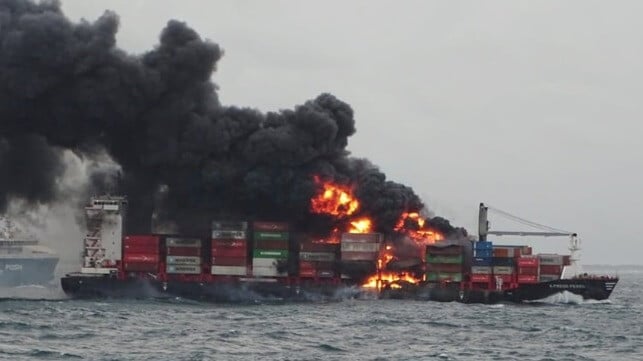Allianz: Fires, Cargo/Vessel Losses, Theft, Drive Up Insurance Claims

Global insurance giant Allianz Global Corporate & Specialty released a new report analyzing the key trends driving marine insurance claims and it comes as no surprise that over the past five years fire, collision and sinking, and damaged cargo, are the top causes of marine insurance losses by value. However, Allianz highlights new emerging issues that it believes are also contributing to the growth in claims that include port congestion and the size of containerships, as well as an increase in both theft and natural catastrophes.
The marine and cargo insurer analyzed more than 240,000 marine insurance industry claims worldwide between January 2017 and December 2021, identifying claim and risk trends that are driving major loss activity in the sector. They also compared the current period to the prior five years.
The total value of the claims over the past five years was approximately $9 billion. Loss from fire was the largest portion of the claims by value (18 percent) but collision and the loss of the ship due to sinking was a close second in the value of claims (17 percent). Damaged goods and machinery failure aboard ships were tied (12 percent each) followed closely by natural catastrophes ranging from floods to hurricanes (9 percent). Collectively these five categories accounted for two-thirds of the claims by value.
"The number of fires on board large vessels has increased significantly in recent years, with a string of incidents involving cargo, which can easily lead to the total loss of a vessel or environmental damage," said Régis Broudin, Global Head of Marine Claims at AGCS. "At the same time, the shipping sector is also having to deal with many other challenges including a growing number of disruptive scenarios, supply chain issues, inflation, time-pressured crew members and employees, increasing losses and damages from extreme weather events, implementing new low-carbon technology and fuels, as well as Russia's invasion of Ukraine."
Growing fire concerns stemming from the transportation of lithium-ion batteries have been repeatedly discussed and cited as the probable cause of several significant fire losses in recent years. This is adding to the persistent danger from mis-declared/non-declaration of dangerous cargos which has also been cited as a frequent cause of catastrophic losses. Allianz reports that fires accounted for 18 percent of the value of marine claims analyzed (equivalent to around €1.65 billion over the past five years) up significantly from 13 percent of the value of claims for the five years ending July 2018.
While cargo is often cited as a cause of the claim, Allianz however also cites “a recent increase in engine room fires may reveal some underlying risk around crew competencies.” Among the risk trends Allianz identifies for the future are further commercial pressures that could contribute to poor decision-making.
“With the pressure on vessels and crew currently high, the reality is that some may be tempted to ignore issues or take shortcuts, which could result in losses,” the insurer writes in its analysis of market trends.
Climate change is also increasingly affecting marine claims with natural disasters having become the fifth biggest cause of marine insurance claims, by frequency and severity. According to their analysis, at least a quarter of the 54 total vessel losses reported in 2021 were due to extreme weather conditions. As another example, they highlight the 2022 impact of droughts and low water levels of shipping on both the Rhine and the Mississippi River.
Another factor contributing to the size of claims is an increase of more than a quarter (26 percent) in the value of the global fleet, which they report has reached $1.2 trillion. They also cite the increase in the value of individual shipments as well as the impact of inflation which is driving up the value of ships and cargo as well as the cost of repairs.
As the value of shipments rises and the number of containers moving aboard individual ships and through the ports increases, Allianz reports that damaged goods, including cargo, have become the top cause of marine insurance claims by frequency, and the third largest by value. The most common claims are physical damage, typically from poor handling, storage, and packing, but they also report an increase in temperature variation claims. The concentration of cargo aboard bigger ships, port congestion, labor shortages, and constrained cargo capacity they point to as future trends that could increasingly contribute to losses. The recent boom in container shipping has also affected cargo claims with a global shortage having resulted in substandard and damaged containers being brought back into use resulting in losses.
Cargo theft is the third most frequent cause of claims with criminals targeting consumer electronics and high-value commodities such as copper, reports Allianz. Cargo they note is typically stolen from ports, warehouses, or during transits.

that matters most
Get the latest maritime news delivered to your inbox daily.
"The risk of theft and damage to high-value cargos needs to be addressed with additional risk mitigation measures, such as GPS trackers and sensors that provide real-time monitoring on position, temperature, moisture shock, and light and door openings, for example," said Captain Rahul Khanna, Global Head of Marine Risk Consulting at AGCS. "At the same time, cargo interests need to keep a close eye on insured values. Clients may need to adjust their insurance and policy limits, or risk being underinsured – we have already seen claims for high-value container cargos where the cargo interest was underinsured by as much as $20 million."
Looking to the future, Allianz also identifies the transition to green shipping as creating new risks. They point out that machinery breakdown is already the fourth largest cause of claims by frequency and value. Insurers they note have already seen claims related to fuel contamination. They point to these claims as just the first unexpected consequences as the industry develops more sustainable forms of propulsion and vessel design and increases its use of alternative fuels.
